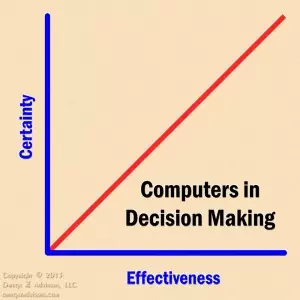Computers in Decision Making

As our information, analysis and decisions become uncertain, computers become less effective as decision-making tools.
Chess is a relatively easy decision-making task for computers. Thus, historically, the defeat of Garry Kasparov by Deep Blue was inconsequential when we consider computers still have problems with Go and Poker. The question is, “Why?”
The article, “3 Humans + 1 Computer = Best Prediction” (Harvard Business Review, May 2013 edition) by Matthias Seifert and Allègre Hadida, gives excellent insight into this question. Pragmatically, the answer will help us use computers better as tools in our decision-making. Their conclusion is that it’s a matter of certainty, certainty relative to our information, analysis and decisions.
A wealth of historical information generally represents high informational certainty. Knowing how to analyze this information to form conclusions represents high analytical certainty. Knowing how these conclusions form a decision represents high decision-making certainty. Another way to look at certainty is structure. The more structured and logical the information, analysis and decision are the more effective a computer becomes as our tool.
For example, introducing a proven product into a similar market will have a wealth of historical data, of experience in interpreting that data, and of decisions to make from those interpretations. Conversely, introducing new, very different products in a dissimilar market won’t have this certainty. Computers help more in the first situation than they do in the second.
Thus, computers will be less helpful when:
- Information is scarce or highly variable without a discernible pattern
- Information produces many divergent conclusions
- Conclusions don’t present a clear cut decision
The problem is that we have a tendency to ascribe much more help to computer models than we should in these situations. We need to remember that no matter what the model says, we most likely have more experience than the computer.


Uncertainty is the fact of life and business; probability is the guide for a “good” life and successful business. The concept of probability occupies an important place in the decision-making process, whether the problem is one faced in business, in government, in the social sciences, or just in one’s own everyday personal life. In very few decision making situations is perfect information – all the needed facts – available. Most decisions are made in the face of uncertainty. Probability enters into the process by playing the role of a substitute for certainty – a substitute for complete knowledge.
Yes, Stella, you are right, “Most decisions are made in the face of uncertainty” especially some certainty. It’s difficult to claim we are certain of knowing all information. Thank you for visiting. ~Mike
Just seeing this, Mike, via the Twitter post from you… As we’ve discussed in the past, there are only three certainties: (1) death; (2) taxes or jail; and (3) the existence of uncertainty!!! Computers may be able to deal with data faster and more consistency; BUT the approach is designed and coded by humans – uncertainty can never be converted to certainty, for me at least …
No doubt, John. It is just amazing how many make decisions via computers without ever questioning them. After all they are built on algorithms which are nothing more than mathematical assumptions of how the world works. We need to challenge them as with any other assumptions.